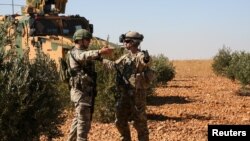Turkey and the United States said they agreed on Wednesday to establish a joint operation center in Turkey to coordinate and manage a planned safe zone in northern Syria.
After three days of talks in Ankara, the two countries said the safe zone on Syria's northeast border with Turkey should be a "peace corridor," and that every effort would be made so that Syrians displaced by war can return to their country.
The agreement was announced in separate statements issued by Turkey's Defense Ministry and the U.S. Embassy in Ankara.
Neither statement said whether they had overcome two main points that had divided Washington and Ankara: how far the proposed safe zone should extend into Syria, and who would command forces patrolling the area.
Turkey's lira strengthened after the announcement, which followed warnings from Turkey that it could launch unilateral military action in northern Syria if Ankara and Washington failed to reach agreement on the safe zone. The lira stood at 5.478 at 1413 GMT, up nearly 1% on the day.
Turkey and the United States, allies in NATO, have been deadlocked for months over the scope and command of the zone, given the presence of Kurdish YPG militia that fought alongside U.S. forces against Islamic State militants, but which Ankara sees as terrorists who pose a grave security threat.
Ankara has accused Washington of stalling on setting up the safe zone, which would extend hundreds of kilometers along Syria's northeastern border, and has demanded that the United States sever its ties with the YPG.
Defense Minister Hulusi Akar had said earlier that the United States was shifting closer to Ankara's views on the proposed safe zone, adding that Turkey's plans for a military deployment there are complete.
"Our plans, preparations, the deployment of our units in the field are all complete. But we said we wanted to act together with our friend and ally, the United States," state-owned Anadolu Agency quoted him as saying.
Imminent Incursion
Washington has proposed a two-tiered safe zone, with a 5-kilometer demilitarized strip bolstered by an additional 9 km cleared of heavy weapons - stretching in total less than half the distance into Syria that Turkey is seeking.
Turkey has also said it must have ultimate authority over the zone, another point of divergence with the United States.
Three Turkish officials who spoke to Reuters this week had expressed impatience that the talks have yet to yield results, and warned that Ankara was ready to act on its own.
Turkey has twice sent forces into northern Syria in the last three years, citing security concerns caused by Syria's eight-year-long civil war, and President Tayyip Erdogan said on Sunday a third incursion was imminent, targeting YPG-controlled territory east of the Euphrates river.
U.S. President Donald Trump announced last year that U.S. forces would leave Syria and began an initial withdrawal, a decision applauded by Ankara, and the two NATO allies agreed to create the safe zone.
On Tuesday, a U.S. Defense Department report warned about a revival of Islamic State in Syria's northeast, saying U.S.-backed Kurdish groups were not equipped to handle the resurgent jihadist cells without U.S. support.
"The partial [U.S.] drawdown [has] occurred at a time when these fighters need additional training and equipping to build trust with local communities and to develop the human-based intelligence necessary to confront resurgent [Islamic State] cells and insurgent capabilities in Syria," the report said.





